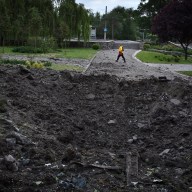By Georgina Prodhan and Irene Preisinger
MUNICH, Germany (Reuters) – China’s biggest maker of industrial robots, Siasun, is looking for acquisitions in Europe to expand the proportion of sales it makes abroad, its president said on Wednesday. China is the world’s largest robot market, but government support is rapidly expanding the number of robot makers, intensifying competition while growth is slowing.
“We have a team in Europe. They are looking for robot companies, electronics companies, controller companies and so on. They want to buy,” Daokui Qu said in an interview at the Automatica robotics fair in Munich. Chinese home-appliances maker Midea last week launched a 4.5 billion-euro ($5.1 billion) bid for German industrial robot maker Kuka, the biggest German company yet to be targeted by a Chinese buyer. Qu said he aimed to raise the share of sales that Siasun makes abroad to 40 percent, from 20 percent, in five years’ time.
Siasun has a market capitalization of 39.4 billion yuan ($5.99 billion) and made total sales of 1.69 billion yuan last year, according to Thomson Reuters data.
Qu estimated that prices for industrial robots were falling by about 5 percent a year in China as the number of domestic competitors explodes.
“In the last three to five years, many, many new companies appeared – maybe up to 800. It’s a terrible number,” he said. “It’s fierce, fierce competition.” China’s industrial robot market is dominated by foreign players such as Japan’s Fanuc, Swiss ABB and Kuka, but the International Federation of Robotics estimates the share of domestic players rose to 31 percent last year from 25 percent in 2013. Qu said he believed Siasun was ahead of the pack in China but a tier below foreign competitors in terms of technology.
Siasun has won foreign customers including General Motors, Ford and Schneider Electric by competing in areas outside the core area of industrial robots, which are mainly stationary and do heavy work enclosed in cages. These include mobile robots, which can navigate spaces and move objects around, and service robots used for personal care, in the home or in medical environments – where Qu said Siasun had gained expertise thanks to China’s large elderly population. Qu said many Chinese robot makers could go out of business because fierce price competition would not allow them to spend what they needed to on research and development.
“Maybe some of the robot companies in the future will go and die,” he said.
(Editing by Ludwig Burger and Alexander Smith)

















